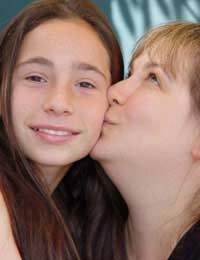Family and Friends Coping with Eating Disorders

Individuals with eating disorders are often highly secretive of their behaviours and rarely will an anorexic, bulimic or binge eater come forward and not only recognise their disorder but ask for help as well. Instead, it is often family and friends who are left to intervene and cope with the fact that a loved one is putting their health at risk.
Though it can be hard, family and friends must remember that the eating disorder itself is a cry for help, and that the individual suffering from the eating disorder is highly vulnerable and in need of support. While this can be hard to remember when faced with the daily challenges of living with someone who suffers from an eating disorder, it is the love and patience of family and friends that is often the difference between recovery and the alternative.
Interventions and Eating Disorders
Confronting an individual suspected of harbouring an eating disorder takes courage. Rarely will a confrontation or intervention be greeted warmly, and in fact the situation may turn ugly before it can be resolved.If you are worried about a family member or friend’s life, however, don’t let a few harsh words stop you. Instead, observe the individual in question and take note of possible signs and symptoms of an eating disorder.
When you feel confidence that you have enough evidence, ask to speak with the individual in private and explain the behaviours that you have observed and why you suspect an eating disorder. Do not become aggressive during this discussion, but instead use a calm and non-confrontational tone. Remind the individual that you love and care for him/her, but can not sit by while (s)he harms him/herself.
Finally, explain the options for diagnosis and treatment, and if you are prepared to ask for help without his/her consent then it is best to make this known. If (s)he is ready to seek help, help him/her to make contact with the professionals who will diagnose and ultimately treat him/her.
Supporting Individuals with Eating Disorders
Supporting an individual in recovery from an eating disorder can be a thankless job, and the recovery itself is as much physical work as it is mental work. Family and friends should be ready to discuss an individual’s treatment plan, attend family therapy sessions, remain firm regarding healthy menus and meal plans, encourage exercise only for health and fun, and guard against secret binges or purges. Family and friends should also be prepared to cope with emotional outbursts (that will likely replace disordered eating behaviours), to remind the individuals that (s)he is loved and valued, and to praise an individual’s talents and triumphs, even if there are a few slips back into disordered eating along the way.Coping Strategies for Family and Friends
While supporting an individual in recovery from an eating disorder can be an emotional and tiring task, there are a variety of ways that family and friends can relax and recharge their batteries in order to better cope.Scheduling at least one solid block of free time, even if it is for as little as 20 minutes per day, can have a great benefit on an individual’s outlook and patience. Spending this time napping, taking a warm bath, reading a good book, sipping a cup of coffee in a café, going for a jog, writing letters or even just enjoying the solitude are all means of refreshing both the body and the spirit for the next stretch of the long road to recovery.
Support groups of family and friends of individuals with eating disorders exist across the UK and can be a great place to socialise and share experiences. For more information, ask a medical professional for a referral or contact the National Centre for Eating Disorders.


Re: Eating by Texture
i can't eat porridge, yogurt and the most types of meat. also i can't drink kefir and juices. i just can't stop gagging while eating/drinking…
Re: Colour Coded Eating
I eat all colors but I can't have more than one color in my mouth at a time, like I can't eat fruity pebbles there's too many colors that I…
Re: Eating by Texture
I need to understand my oroblem. Eating health is hard. I cant really diet due to food allergies and diabetes, but I have a lit of food…
Re: Eating Disorders and the Physical Signs
I’ve been to the gp several times but apparently I don’t look anorexic. I’m 5’3 and weigh around 49 kg. When I eat I…
Re: Dental Damage and Eating Disorders
If you're worried about your weight, eat healthy, research your ideal weight for your age, height and bone structure and…
Re: Eating by Texture
Hi I've avoided soft textured food forever. My father also & he has this full blown, only eats crunchy things. Over the decades it's got better…
Re: Recovering From Anorexia: How Do I Prevent Swollen Stomach?
My daughter is recovering from anorexia (34 hrs old - diagnosed 15 years ago) What do I…
Re: Eating by Texture
I don’t like most veg. The only raw veg I can eat is cucumber. Cooked, I like carrots, cauliflower, baby corn, onion (if it’s well cooked and/or…
Re: Pica Disorder
Potato Boy back. I was doing great for a while but then shelby left me for my dad. I was doing so good. My best friends had an intervention for me and…
Re: Why Does Eating Make Me Feel Sick?
I'm a 22 year old female who has been suffering with anorexia for four years. My fiance and I recently broke up, and I had…